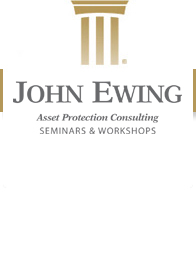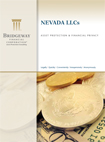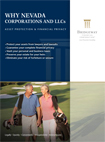Nevada is Tax Heaven

You can separate your business assets from your operating company to protect your equipment and other assets from customer liability and you can lease back your assets for significant tax savings.
Nevada is the only state that provides “Charging Order Protection”. This prevents personal creditors from seizing your corporate shares and taking control.
- No corporate income tax
- No capital stock tax
- No gross receipts tax
- No succession tax
- No tax on issuance of corporate shares
- No inventory tax
- No estate tax
- No personal, state, city, or county income tax
- No franchise tax
- No minimum start-up capital required
- No gift tax
- No stock sale or transfer tax
- No inheritance tax
- No annual reports necessary
- No need to list assets

Other Advantages
- Cut your audit risk
- 300+ tax deductions

- Nevada is the only state that prevents personal creditors from seizing shares and liquidating your assets
- One-person entities allowed
- No attachment of corporate shares by personal creditors
- No delay - can be formed in 24 hours
- Corporate meetings may be held anywhere
- Nevada Corporations and Limited Partnerships can own property in any state without having to be incorporated in that state
- Shareholders and Directors need not be residents (or U.S. citizens) and do not need to come to Nevada
- Nevada allows for section 355 Tax Free spin-off
Protecting Financial Investments
Board members of publicly traded companies are finding out just how dramatically the Sarbanes-Oxley law and recent events have changed the business world. Even though many companies are being run cleanly, this new business environment now poses significant personal risk to managers and employees.
Under new laws of personal liability, there are now few ways to insulate directors, managers and employees from personal liability and the focus of asset protection planning must be on protecting family assets, principally the family home and investment accounts.
In this case, the Weber family had been residing in their house for the past twenty years and a lawsuit made the prospect of losing their home, furnishings, investments, and literally everything they had worked for in a single lawsuit unbearable. The first step in their protection planning was to transfer ownership of their home from the husband, being the board member of his company, to the wife as her sole and separate property. The next step was for the wife to then contribute the home to an irrevocable trust. This structuring now afforded an insurmountable level of protection for liabilities directed against him, and even provided a significant level of protection against any liabilities that his wife could face, such as in the event of an auto accident.
To protect Mr. Weber’s investment accounts and primary rental properties, he was then shown two primary strategies: First ‘quick claim deed’ all the real estate to LLCs connected to the family’s limited partnership; Second, transfer all ownership of the investment accounts to a properly structured Limited Liability Company (LLC) or an International Business Corporation (IBC) providing bank accounts in the Cayman Islands and 20 million US dollars insurance from Lloyd’s of London Insurance company.
Mr. Weber never even had to sell his stock portfolio; he merely transferred it.

INCORPORATE EVEN IF YOU DON'T HAVE
A BUSINESS
Complete Privacy
There is a reason why almost all successful people choose to incorporate. It permits them to manage their assets
anonymously and their private corporate lives are never made public. Only in Nevada can a corporation be set up so
that you own and control your corporation while your identity and ownership remain a total secret. Some individuals
choose to have a separate corporation for their large assets such as brokerage accounts, a rental property, a boat,
or recreational vehicles.
Profit
Your corporation can maximize profits by taking advantage of the tax laws. A corporation can write off most
purchases of goods, vehicles, and services as expenses. By organizing your activities so that much of the profits go
to a corporation in tax-free Nevada, you can dramatically increase your net income. You pay the government less—and
take home more!
Flexibility
A corporate structure allows you to place different investments under separate corporations. You retain complete
control of all your investments. But if one corporation runs into trouble, it won’t suck the profits away from the
other, more successful, investments. Without incorporation your profitable ventures would have to pay the debts of
any unsuccessful ventures!
Estate Benefits
Because a corporation’s existence is perpetual, your corporation can outlive you. By using estate-planning
strategies that are possible only with a Nevada-based corporation, you may be able to pass your estate to your heirs
without going through probate. This can save both legal costs and inheritance taxes.
Protection
Nevada permits corporations to lien up homes, cars, boats and business assets.
YOU CAN BE COMPLETELY ANONYMOUS
A Nevada is required to list only the name and address of its manager with the Secretary of State. In fact, we can provide a Management Privacy Trust to fill this position, thus ensuring your complete privacy.
Nevada law does not require owners to register with the state. Therefore, you can own all the units and maintain control of all assets, while designating a nominee to act on your behalf and your
identity will be kept completely secret. This makes it impossible for anyone to track down the ownership of your asset protection. Officers are never public record and no yearly renewal fees make them almost as good as a
property trust.
ASK YOURSELF...WHAT IS PEACE OF MIND REALLY WORTH TO YOU?
 salaried or on commission,
with the greatest personal liability protection. Once a lawsuit has been filed, the law will not allow you to move your
assets. You must act ahead of time to protect what you own before it becomes under attack. "Without Asset
Protection you could suddenly lose everything you've worked for!"
salaried or on commission,
with the greatest personal liability protection. Once a lawsuit has been filed, the law will not allow you to move your
assets. You must act ahead of time to protect what you own before it becomes under attack. "Without Asset
Protection you could suddenly lose everything you've worked for!"WITHOUT ASSET PROTECTION YOU COULD LOSE EVERYTHING
A study by the Institute for Legal Reform found:
- Nine out of ten lawsuits in the world are filed in the United States.
- A new lawsuit is filed every two seconds.
- If you own a business or practice a profession you have a one-in-three chance of being named a defendant in a
lawsuit in the next year, and the odds will only grow worse. It is estimated that over 100,000 law school
students are currently approaching graduation.
STOP BEING A TARGET FOR
MONEY-HUNGRY LAWYERS
David Henderson worked hard at his profession and accumulated the rewards that go with success. Then a
disgruntled client named David as a Defendant in a lawsuit and threatened to “take him for everything he was
worth.” But after David and his attorney had a talk with the plaintiff’s attorney, the suit was quietly
dropped.
does not legally “own” anything that a lawsuit or court judgment can take. David had the foresight to shelter
his assets in judgment-proof entities.
ASSET AND LIABILITY PROTECTION
Under the law, Nevada provides for an "artificial person,"
completely separate from the people who own and
operate it.
This is different from an individual or sole proprietorship where the owner bears the full and complete financial responsibility for his or her actions.
In Nevada debts and taxes are separate from those of its owners.
Therefore, Nevada provides an individual in business, whether salaried or on commission, with the greatest personal liability protection.
Nevada doesn't share confidential information about its corporations and limited partnerships with the IRS. In 1992
and again in 2001, the IRS formally requested such an exchange program and the Nevada Governor turned the IRS down
flat!
WHO SHOULD HAVE ASSET PROTECTION
Further, you can separate your business assets from your operating company to protect your equipment and other assets from customer liability. Nevada is the only state that provides "Charging Order Protection" for both corporations and LLCs. This prevents personal creditors from seizing your corporate shares and thereby taking control.
Nevada law clearly makes the actions of a corporation’s representatives exempt from personal responsibility except in cases of outright fraud. The best asset protection is to incorporate; the best place to incorporate is in tax-free Nevada.

Tax Code I.R.S. SEC - 664 Reduces over all Income Taxes
I.R.S. 162 - Over 300 Deductions Available - Create "Friendly Liens" to Protect Equipment.
WHAT IF YOU ARE FACED WITH A LAWSUIT

Do not be fooled - even if you are innocent, that does not mean the courts are on your side. Jurors often side with the plaintiff who appears to need the funds in question rather than the defendant who they assume has money to spare.
Even a judge's own personal feelings or politics can put you in jeopardy. Read the following outrageous quote below:
"As long as I am allowed to redistribute wealth from out-of-state companies to injured in-state
plaintiffs, I shall continue to do so. Not only is my sleep enhanced when I give someone else's money away,
but so is my job security, because in-state plaintiffs, their families, and their friends will re-elect me."
- Chief Justice Richard Neely, West Virginia Supreme Court
If you act NOW it's not too late to shield your assets from plaintiffs and their attorneys. Clients are happy to
learn that there is still a lot they can do to protect their assets.
ANY OF THESE COULD LEAVE YOU PENNILESS AND IN DEBT
- A breach of contract through no fault of your own
- A professional malpractice suit
- Catastrophic medical bills
- A devastating weather event
- Divorce
- Loan guarantees
- Claims from creditors should your business fail
- A lawsuit from disgruntled business partners or employees
- Seizure of your home or other assets without due process by the U.S. Customs or other government agencies with forfeiture power – The Patriot Act
- A huge tax bill and escalating penalties following an IRS audit
- Huge fines for violation of state or federal law because of the actions of an employee
- A negligence or injury claim, whether justified or not, that exceeds any insurance coverage you may have
ASSET PROTECTION

WHY WOULD ANYONE THINK THAT THEY DON’T NEED ASSET PROTECTION

Tax code I.R.C. 704 (Approved 1916) Restricts Lawsuits to "The Charging order" Rev. Ruling 77-137
YOUR ESTATE COULD GO TO THE GOVERNMENT, NOT TO YOUR HEIRS
© 2025 John Ewing, All Rights Reserved. Protected by
copyright laws of the United States and international treaties. Any reproduction, copying, or redistribution,
(electronic or otherwise) in whole or in part, is strictly prohibited without the express written permission of
John Ewing 4705 S. Durango Dr 100-A1 Las Vegas, NV 89147.
Asset Protection from Lawsuits, Wealth Preservation, Debt Elimination, Business Entity Formation, Financial Strategy
Consulting, Tax Reduction Consulting are based on sound principles of law, prudent forward planning, and compliance
with the Internal Revenue Code. Tax evasion is illegal. Per IRS Circular 230, nothing herein may be used by any
taxpayer to avoid penalties under the Internal Revenue Code for noncompliance or to support the promotion of any
particular federal tax transaction. Taxpayers should confer with a Certified Public Accountant as to federal tax
matters and timely file any applicable IRS forms or tax returns.
Not an offer of securities. Not intended as individual legal, tax or financial advice.
DISCLAIMER: All information contained in this website is for education purposes only. John Ewing,
and its agents and affiliates, cannot and will not render any legal, investment, financial or tax
advice of any kind, unless said agent or affiliate is duly licensed by the applicable state and/or federal authority
to give said advice. Bridgeway Financial Corporation has been dissolved with the Nevada Secretary of State and is no longer operational. Any reference or references to Bridgeway Financial Corporation in this website and or on any of these website pages, content is strictly for educational and informational purposes only, and does not imply in any way or in any form or in any manner the existance of Bridgeway Financial Coporation or that it is in operation or affliated with this website.
John Ewing is not a broker or agent for any particular investment, but we share information
with our clients about changing market conditions and attractive investment opportunities as we become aware of
them.






